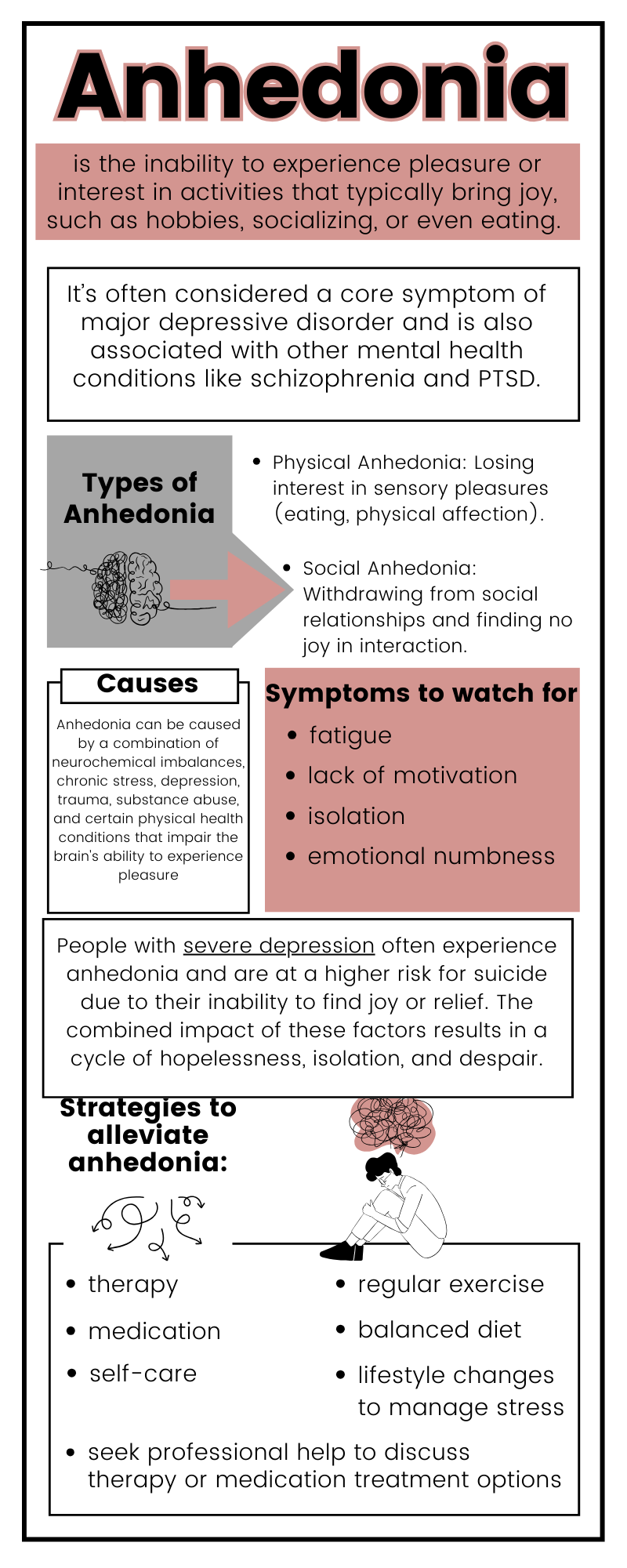Understanding Anhedonia: A Deeper Look Into Its Role in Depression and Suicide
Anhedonia, the inability to experience pleasure, is a powerful and often misunderstood symptom of depression. While most people can relate to feelings of sadness or low energy, anhedonia takes this one step further by stripping away the enjoyment from activities that once brought happiness. It can affect everything from hobbies to relationships, leaving individuals feeling disconnected from life. But beyond its personal toll, anhedonia has a profound connection to both depression and the increased risk of suicide.
For many, anhedonia marks the beginning of a downward spiral. Activities that once provided joy—such as spending time with loved ones, enjoying a meal, or engaging in creative outlets—begin to feel hollow. This emotional numbness can lead to social withdrawal, which further isolates the individual, feeding into the feelings of hopelessness that often accompany depression.
In my own experience, I recall the moment when I realized something was wrong. After a long commute, I sat at my desk trying to push away the deep anguish I felt inside. When a colleague casually asked, "Do you ever smile?" it hit me: I wasn’t fooling anyone. The mask I wore to appear "okay" had cracked. I didn’t feel joy or satisfaction in anything anymore, and I had no idea why. It wasn’t until later, during therapy, that I learned about anhedonia and its link to depression.
Anhedonia is more than just a lack of happiness; it’s a form of emotional detachment that makes it difficult for individuals to feel anything—good or bad. This numbness can heighten the risk of suicide, as it often leaves people feeling that life is devoid of meaning. When the ability to find pleasure disappears, hope can follow closely behind.
Researchers have found that individuals who experience anhedonia alongside depression are at a significantly higher risk for suicidal ideation. The inability to derive any sense of joy makes it challenging to imagine a future where things could improve. This emotional detachment can make individuals feel as though they are merely existing, rather than living.
Anhedonia, the inability to experience pleasure, has been linked to various mental health conditions such as depression, schizophrenia, and bipolar disorder. Research suggests that it may result from decreased activity in the brain's reward centers, like the ventral striatum, which affects the release of dopamine, a key "feel-good" hormone. This reduced activity can make it difficult to enjoy previously pleasurable activities, contributing to social isolation and mood disordersPsychology Today Cleveland Clinic
However, understanding the nature of anhedonia can be the first step toward healing. Treatments for anhedonia often mirror those for depression and can include a combination of medication, psychotherapy, and lifestyle changes. Cognitive Behavioral Therapy (CBT) is often used to help individuals identify and challenge the thoughts that contribute to their sense of hopelessness. Medications like antidepressants can also help to correct the chemical imbalances in the brain that contribute to the condition.
In my own recovery, the journey from anhedonia was long and required deep emotional work. While I eventually found relief from my major depressive symptoms, the persistent lack of joy took more time to address. I had to make significant lifestyle changes, listening more closely to my own intuition and learning to advocate for myself. It wasn’t just about finding happiness but recognizing that suffering shouldn’t be the norm.
Today, my life looks different—less about enduring and more about listening to what I truly need. The reality of anhedonia is that it isn’t just a symptom to be managed but a signal that deeper healing is required. And while it may feel like a dark cloud over your life, taking small, meaningful steps toward recovery can bring back the light.
What Can Be Done? Recognizing anhedonia and seeking help is essential, especially because it’s closely tied to suicidal thoughts. If you or someone you know is dealing with persistent loss of pleasure in life, it’s important to seek professional support. Therapy, medication, and changes in daily routine can all contribute to recovery, and even small improvements can offer hope where there was once only despair.
Anhedonia is a complex condition that deeply affects those living with depression. But by shedding light on its impact and promoting a better understanding of its risks, we can offer support and hope to those who need it most.

